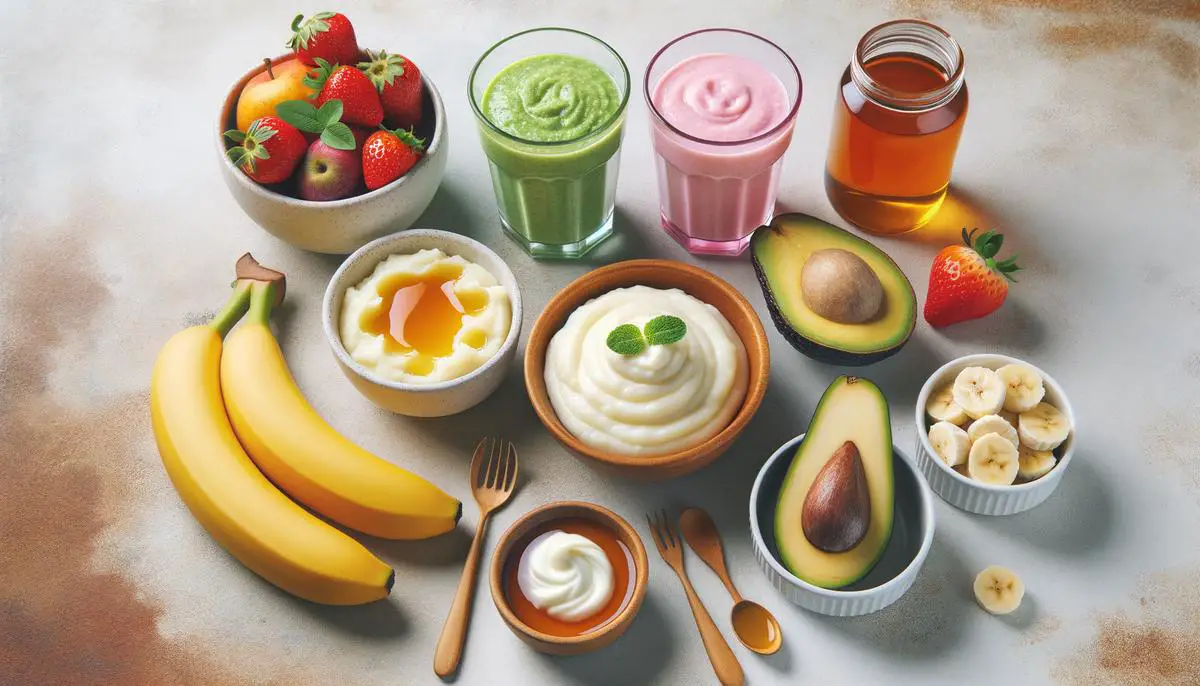Following a periodontal surgery, your dentist will often recommend a diet consisting mainly of soft foods. This isn’t merely a suggestion but a critical part of your recovery process.
Periodontal surgery involves various procedures aimed at treating the gums and bone surrounding teeth, addressing conditions that can lead to tooth loss. Eating soft foods is not about convenience but about ensuring a smooth healing journey. Let’s delve into why a post-periodontal surgery diet is crucial.
The Importance of Soft Foods After Periodontal Surgery
First off, soft foods significantly reduce strain on your gums and teeth. After surgery, your gums are tender, possibly swollen, and in the midst of healing.
Demanding that they process hard, crunchy, or sticky foods is akin to asking someone with a sprained ankle to run a marathon. Soft foods, however, require less chewing effort, minimizing stress on the surgical site and preventing the reopening of wounds.
Additionally, soft foods lower the risk of infection. Post-surgery, your gums have open wounds susceptible to bacteria. Hard or sharp foods can create small cuts or aggravate the surgical site, providing an entry point for bacteria.
By sticking to soft, easily consumable foods, you’re essentially shielding your wounds from potential bacterial invasion.
It’s also about controlling inflammation. Consuming hard foods can lead to trauma at the surgical site, triggering an inflammatory response. This inflammation can prolong the healing period, potentially leading to complications. Soft foods, by contrast, are gentle on your gums, helping keep inflammation in check.
Moreover, soft foods contribute to nutritional intake during recovery. Nutrition plays a pivotal role in healing. Soft foods can be both nutritious and gentle, ensuring you get the essential vitamins and minerals without jeopardizing your surgical sites.
Options like smoothies, soups, and mashed vegetables are packed with nutrients while being extremely kind to your gums.
Finally, easing into normal eating habits is crucial. Post-surgery, you can’t immediately return to your standard diet. Soft foods serve as a transitional diet, gradually preparing your gums to handle more solid foods as they heal. This step-by-step approach safeguards your recovery, ensuring the long-term success of the periodontal surgery.
In conclusion, prioritizing soft foods after periodontal surgery is not just a dietary adjustment but a necessary step toward a successful recovery. It minimizes physical stress on your gums, reduces infection risks, and ensures you glean essential nutrients without straining the surgical site.
So, embrace the soft food diet with understanding and patience, recognizing it as a key ingredient in your healing process.

Hydration and Healing
Ensuring adequate hydration plays a pivotal role in speeding up the recovery process post-surgery. Water, often overshadowed by more complex nutritional advice, is the unsung hero of the healing period. Let’s dive into how staying well-hydrated can aid your body in bouncing back more efficiently after surgery.
First off, maintaining sufficient hydration levels is crucial for keeping your body’s cells in prime operating condition. Water serves as a medium for various enzymatic and chemical reactions in the body, facilitating quicker wound healing.
Every cell, tissue, and organ in your body needs water to work correctly. By staying hydrated, you’re giving your body the fuel it needs to repair itself.
Let’s not forget about water’s role in detoxification. After surgery, the body might be dealing with medications and anesthesia, substances it’s eager to flush out.
Hydration comes into play by supporting kidney function, allowing these waste products to be excreted more efficiently. This detox process is gentle on the body and helps reduce the risk of complications related to the buildup of unwanted substances.
Circulation is another critical factor in recovery. Adequate fluid intake ensures that the blood maintains a proper consistency, not too thick, which can hamper its flow. Improved circulation means more oxygen and nutrients are delivered to the healing site, promoting faster tissue repair and regeneration.
This aspect of hydration is especially important in the initial days following surgery when the body is in a heightened state of repair.
Hydration also aids in digestion and prevents constipation, a common post-surgery complaint, especially for patients prescribed opioid pain relievers.
Drinking plenty of fluids helps keep the digestive system moving and prevents the discomfort and potential complications of constipation. It’s a simple yet effective way to maintain comfort and focus on recovery.
In terms of practical advice, aim to drink at least 8-10 glasses of water daily, although your doctor might adjust this recommendation based on the specifics of your surgery and overall health.
If water isn’t your beverage of choice, remember that herbal teas and clear broths also count towards your fluid intake. However, it’s wise to steer clear of caffeine and alcohol during recovery, as they can lead to dehydration.
Incorporating hydration into your post-surgery recovery plan might seem like a minute detail compared to the bigger picture. However, its impact is anything but small.
Something as simple as drinking water can significantly enhance the body’s natural healing mechanisms, reduce the risk of post-operative complications, and ultimately lead to a smoother and quicker recovery.
As you navigate through your healing journey, keep a water bottle handy, and remember that each sip brings you one step closer to recovery.

Navigating Pain and Nutrition
Moving forward, let’s talk about managing pain while ensuring your body gets the nutrition it needs. Sometimes, following surgery or an injury, eating can feel like a daunting task, but it’s crucial to keep your body fueled for recovery. Here are effective strategies to manage pain and maintain nutritional intake:
- Opt for Nutrient-Dense Liquids: Start with smoothies, broths, and meal replacement shakes. These options pack a ton of essential nutrients in a form that’s gentle on your system. Think of blending fruits with spinach or kale for a vitamin boost or sipping on bone broth for minerals.
- Incorporate Easily Digestible Proteins: Your body needs protein to heal. Soft, easily digestible options include Greek yogurt, scrambled eggs, and cottage cheese. These provide the building blocks for repair without putting much strain on your digestive system.
- Use Spices and Herbs for Anti-Inflammatory Benefits: Incorporating anti-inflammatory spices like turmeric, ginger, and garlic can help manage pain naturally. Adding these to your meals not only enhances flavor without the need for excessive chewing but also offers health benefits.
- Small, Frequent Meals: Eating smaller amounts more frequently can help maintain energy levels and prevent the discomfort of a full stomach. This approach makes it easier to consume enough calories and nutrients throughout the day.
- Choose Soft, Cooked Vegetables: While raw veggies might be challenging, soft-cooked carrots, squash, and beets can be perfect. They’re easier to consume and still provide plenty of vitamins, fiber, and minerals.
- Lean on Healthy Fats: Avocado, olive oil, and nuts (if tolerated or finely ground into butters) are excellent sources of healthy fats. They’re calorie-dense, helping you meet energy needs without bulking up your meal volume.
- Stay Mindful of Fiber Intake: When transitioning back to solid foods, fiber becomes crucial to prevent constipation, especially if you’re on pain medication. Incorporate soft, high-fiber foods like applesauce and oatmeal gradually.
- Listen to Your Body: Paying attention to how certain foods make you feel is essential. If something doesn’t sit right, consider alternatives and adjust accordingly. Everyone’s recovery and dietary needs are unique.
- Consult with a Nutritionist: If managing pain while ensuring proper nutrition becomes overwhelming, speaking with a nutritionist familiar with post-surgery diets can be incredibly valuable. They can tailor recommendations to your specific needs.
Planning an Effective Post-Periodontal Surgery Diet
By adopting these strategies, you can manage pain effectively while ensuring your body receives the essential nutrients it needs to heal. Remember, the goal is to support your body’s recovery journey, and nutrition plays a pivotal role in that process.








